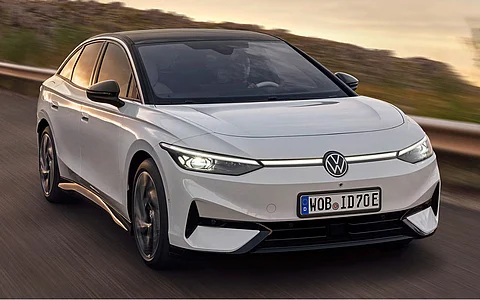

Volkswagen has officially scrapped plans to bring its highly regarded ID7 electric sedan to North America, citing declining EV sales and an uncertain market.
The decision marks yet another setback for legacy automakers struggling to ramp up EV production while navigating shifting consumer demand and supply chain challenges.
The luxury sedan was highly regarded, even for EVs, touting nearly 300 horsepower and 600 kilometres of range on a single fast charge.
It comes as the North American EV market cools, hitting high-end European brands particularly hard. Luxury EVs from Volkswagen, Mercedes-Benz, and BMW have faced sluggish demand as buyers increasingly opt for more affordable models or hold off on EV purchases altogether due to concerns over charging infrastructure, range anxiety and high interest rates.
The ID.7, which launched in Europe and China in 2023, was initially set to debut in North America in mid-2024. However, VW first delayed its arrival last year, citing “changing market dynamics,” before ultimately pulling the plug entirely.
Volkswagen’s North American EV strategy now pivots toward SUVs and crossovers, which remain more popular than sedans. The company is doubling down on the ID.4 crossover, which is produced at its Chattanooga, Tennessee plant, and focusing on the highly anticipated ID.Buzz ‘hippy bus’ which has generated strong interest among buyers.
Volkswagen isn’t alone in adjusting its EV rollout plans. Automakers across North America and Europe are struggling to scale production, build new factories, and secure battery supply chains—all while trying to turn a profit on capital-intensive EV investments.
To wit:
* Ford has cut production of the F-150 Lightning due to slowing demand.
* GM delayed its electric Silverado pickup and is reconsidering its EV launch cadence.
* Mercedes-Benz and BMW have seen slower-than-expected EV growth in the U.S., forcing them to recalibrate their strategies.
Analysts said the problem isn’t just demand. It’s also supply chain bottlenecks and production costs.
Building EVs requires new factories, battery partnerships and new supply chains, all of which take time and money to develop. Consequently, VW is investing billions in North American EV production, including a new battery plant in Canada, but those investments won’t immediately bear fruit — if ever.
Volkswagen’s decision reflects a broader challenge facing the EV industry. After years of rapid growth, the market is entering a period of turbulence, with high borrowing costs and uneven charging infrastructure slowing adoption.
While demand remains strong in Europe and China, North American automakers must navigate shifting consumer preferences, manufacturing challenges, and policy uncertainty. Until supply chains stabilize and production costs drop, observers said buyers can expect more delays, cancellations and strategic pivots from the major automakers in the coming years.
Meanwhile, the Canadian government is still pushing ahead with EV vehicle mandates stipulating that all cars sold in this country be electric by 2035. That’s despite revoking incentive rebates and US president Donald Trump’s move to quash mandates south of the border.
“Canada expects the shift toward zero-emission vehicles to continue this decade as electric vehicles continue to become more affordable as costs fall and new vehicle models enter the Canadian market,” spokesperson Brandon Clim told the Toronto Sun.
